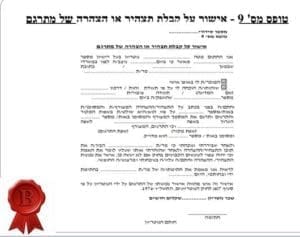Notary translation Israel – Notarized Translator Statement
What is the difference between a notary translation, a certified translation and a “notarized translator statement”? Which of these is required for translated documents submitted to the Israeli Ministry of Interior?
Our law firm specializes in legal and notarized translation, certified translation, signature verification, and notarized approval of translator statements. In this article, we will look at the subject of notarized certification of a translator’s affidavit; when and why is such certification obtained and used?
Certified translation, notarized translation, and notarized verification of a translator’s statement:
Certain countries, such as the US, recognize two types of translations for official documents. The first is a “certified” translation, wherein the translator provides their professional qualifications, affirming the accuracy of the translation. The other is a notarized translation, which has two “sub-types”. The notary may speak both languages in question, and personally verify that the translation is accurate. Conversely, the notary may not speak the source languages, and therefore merely affirms the translator’s statement and or professional credentials.
For most cases and clients, in Israel and around the world, both “sub-types” of notarized translation are equally valid. However, as a notarized translator’s statement relies on translator’s professional skills rather than the notary’s own understanding of the document, it may be considered unacceptable, by Israeli offical government agencies, in certain circumstances.
Notarized Translator Statement – Israeli Law and Notary Regulations
Section 14A of the Notary Regulations, 1977, governs the issue of notary approval of a translator’s statement. A notary can receive a translation from a professional translator and verify that the translator is fluent in both languages.
The notary can only verify the veracity of the translation if he personally speaks both languages.
Which Israeli authorities will only accept a translation verified by the notary?
It is important to remember that certain Israeli authorities are unwilling to receive notarized approval of a translator’s statement. For example, the Population and Immigration Authority of the Interior Ministry insists on all translated documents being verified as correct by a notary pursuant to Section 7 (4) of the Notary Law, 1976.
However, it is difficult or impossible to find a Israeli notary who speaks certain relatively “exotic” languages. A notarized translator’s statement is often used as an acceptable substitute in such cases, even if the documents are submitted to the Population Authority.
Israeli Notaries must specify whether the notarized translation is based on a translator’s affidavit
A translation which is notarized based on a translator’s statement regarding the veracity of the translated material must have the notary specify that “this confirmation does not constitute confirmation of the translation’s veracity by the notary under section 7 (4) of the notary law”.
Notaries must explain the difference between verification of the translation by the notary versus verification based on a translator’s statement:
In view of the foregoing, and partly because there are Israeli authorities that will not accept a notarized translation translator’s statement, and the client may also prefer for their reasons that the notary speak the translation languages, the notary must explain aforementioned to the client before providing a notarized verification.
It is also advisable to always check with the relevant authorities if they are satisfied with notarized translator’s statement, and then make an informed decision whether it is necessary to obtain obtain a notarized approval of the translation’s veracity from a notary who speaks the language or if the translator’s statement is sufficient.
Notarized Translator Statement – a Summary – Israeli Notary Public
Notary approval of a translator statement is sufficient for most purposes both within Israel and abroad. It should be noted that our office provides notary verification of a translator’s statement in a very wide variety of languages.
Also, in addition to the notary’s approval of the translation, an apostille stamp can be added, in accordance with the Hague Convention, to eliminate the need for authentication of public foreign documents. A notarized translation with an apostille stamp will most probably be accepted in every country that is a member of the Hague Convention above.
Contact us for a translation price estimate – Notarial services in Israel
At our law firm notaries in Jerusalem and Tel Aviv provide notarized translation to and from most of the world’s languages. Contact us for a price estimate regarding translation and notarization.
מאמרים מומלצים

